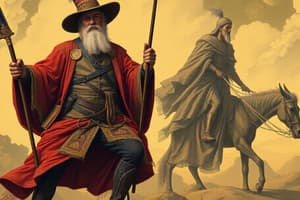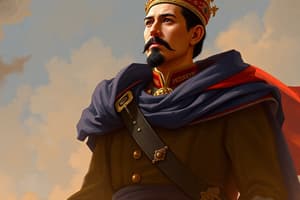Podcast
Questions and Answers
What is a primary cause of inconsistency in historical narratives?
What is a primary cause of inconsistency in historical narratives?
- Common biases across cultures
- Inconsistencies in human memory (correct)
- Consent among historians
- Uniformity in artifacts
Which statement best reflects the nature of controversy in historical accounts?
Which statement best reflects the nature of controversy in historical accounts?
- It is solely based on theoretical perspectives.
- It often results from unresolved inconsistencies. (correct)
- It is marked by unanimous agreement.
- It arises only from verified events.
What was significant about Ferdinand Magellan's journey to the Philippines?
What was significant about Ferdinand Magellan's journey to the Philippines?
- He was viewed as the first European to arrive in the country. (correct)
- He was the first navigator to circumnavigate the globe.
- His voyage was criticized for its lack of planning.
- He did not encounter any local inhabitants.
What initiated the Filipino-American War according to the historical viewpoint?
What initiated the Filipino-American War according to the historical viewpoint?
What was a major aspect of the Educational Decree Act of 1863?
What was a major aspect of the Educational Decree Act of 1863?
How did the Americans influence the Philippine education system?
How did the Americans influence the Philippine education system?
Which factor contributes to historical events being perceived differently?
Which factor contributes to historical events being perceived differently?
What implication does inconsistency have on history according to the content?
What implication does inconsistency have on history according to the content?
Flashcards are hidden until you start studying
Study Notes
Inconsistency and Controversy in History
- Inconsistency: A situation where two facts or pieces of information do not align.
- Controversy: A debate with opposing views, often stemming from inconsistent information.
- Historical Inconsistency: History is prone to inconsistencies due to:
- Human Memory: The fallibility of memory can lead to inaccuracies in historical accounts.
- Manipulation of Artifacts: Intentional altering or misrepresentation of historical objects can distort the truth.
- Personal Bias: Historians' personal beliefs and perspectives can influence their interpretation of events.
Historical Controversies: Case Examples
-
Ferdinand Magellan's Arrival in the Philippines:
- Traditional View: Magellan arrived in the Philippines on March 16, 1521, and is considered the first European to reach the archipelago.
- Alternative View: Some Filipinos claim that there were other Europeans who had visited the Philippines prior to Magellan. Magellan's route was through the Pacific Ocean, as the Indian route was controlled by Portugal.
-
The 1899 Battle of Manila:
- Traditional View: The battle began at the San Juan Bridge, where an Englishman, Pvt. William Grayson, shot and killed a Filipino lieutenant, Anastacio Felix.
- Alternative View: The conflict actually started at the intersection of Sociego and Silencio Streets, and later expanded to the San Juan Bridge.
-
Introduction of the Philippine Public School System:
- Traditional View: The Spanish established separate public schools for boys and girls due to an Educational Decree Act in 1863.
- Alternative View: The American military introduced the Philippine Public School System, bringing teachers from the US on the USS Thomas.
-
Changing Established Knowledge:
- It is difficult to modify already established historical knowledge because it has been verified and widely accepted.
- However, new evidence and research can challenge existing narratives and lead to revisions.
Studying That Suits You
Use AI to generate personalized quizzes and flashcards to suit your learning preferences.





